人教版七年级下册 Unit 11How was your school trip? 单元复习课件(共49张PPT)
文档属性
| 名称 | 人教版七年级下册 Unit 11How was your school trip? 单元复习课件(共49张PPT) |
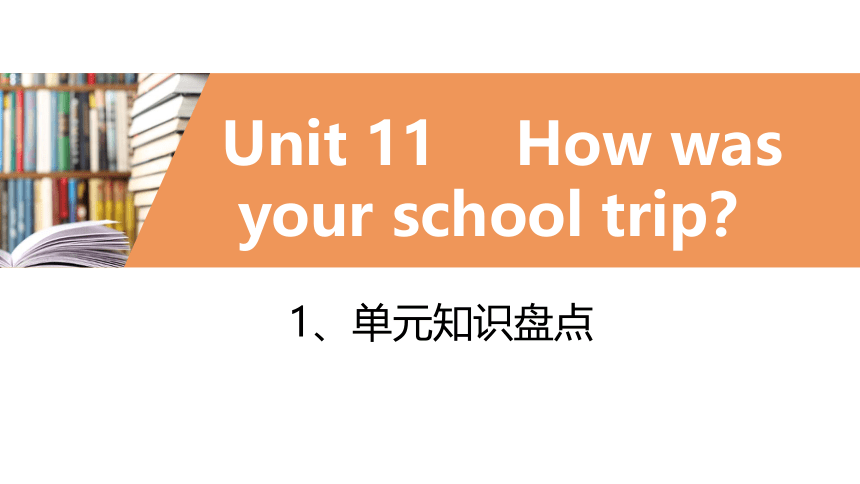
|
|
| 格式 | pptx | ||
| 文件大小 | 503.8KB | ||
| 资源类型 | 教案 | ||
| 版本资源 | 人教新目标(Go for it)版 | ||
| 科目 | 英语 | ||
| 更新时间 | 2022-08-05 00:00:00 | ||
图片预览

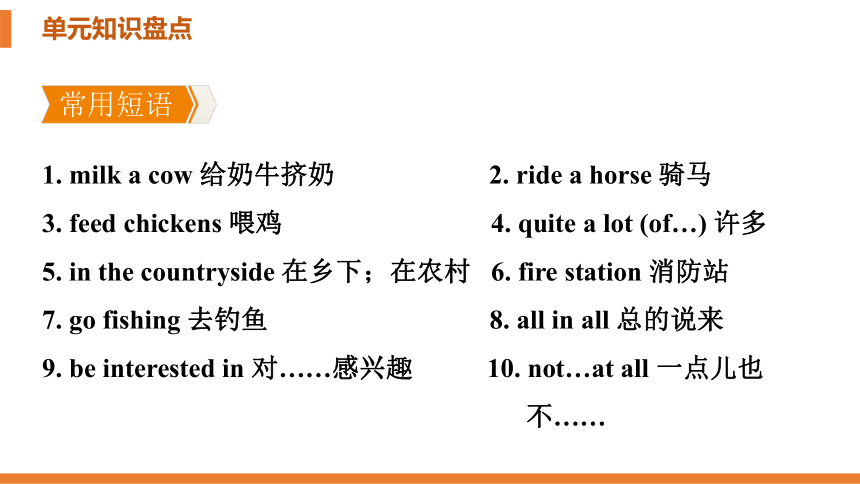
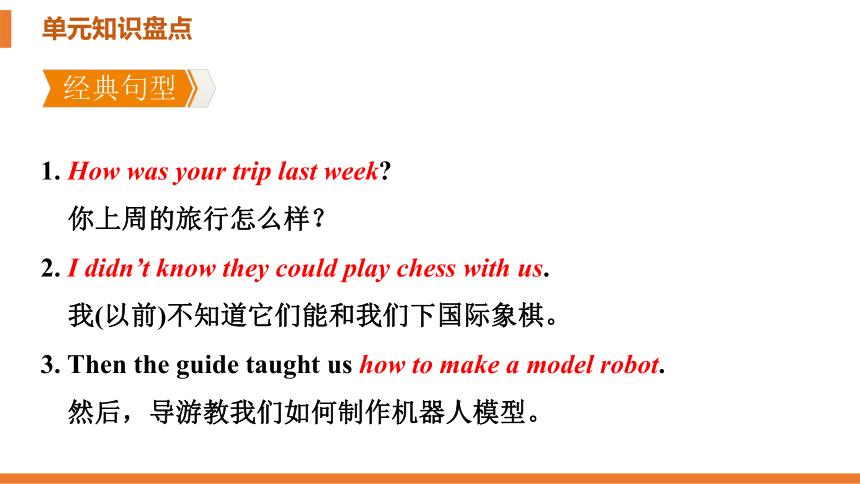
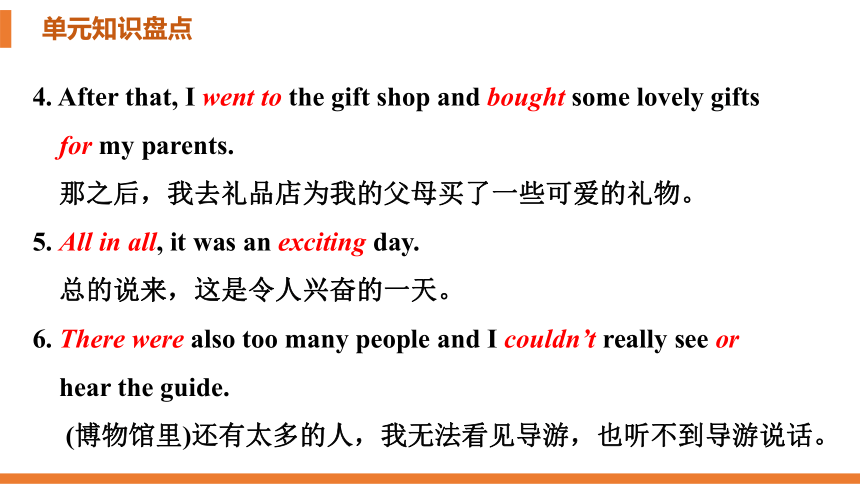
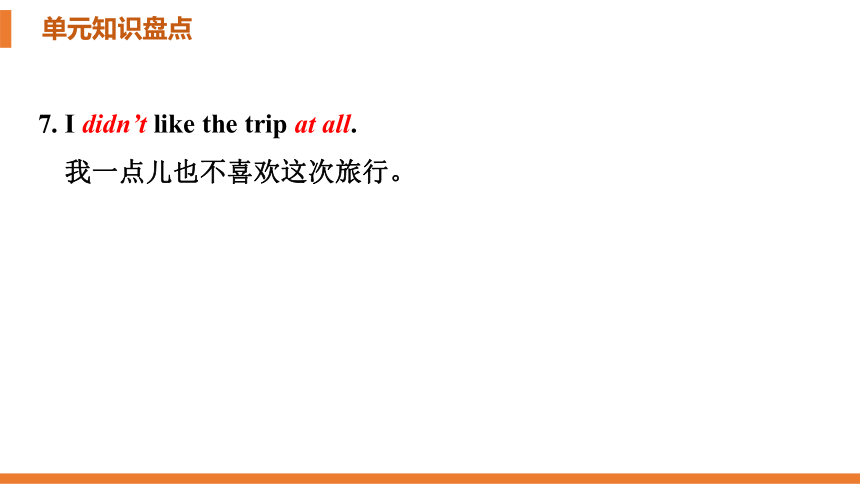
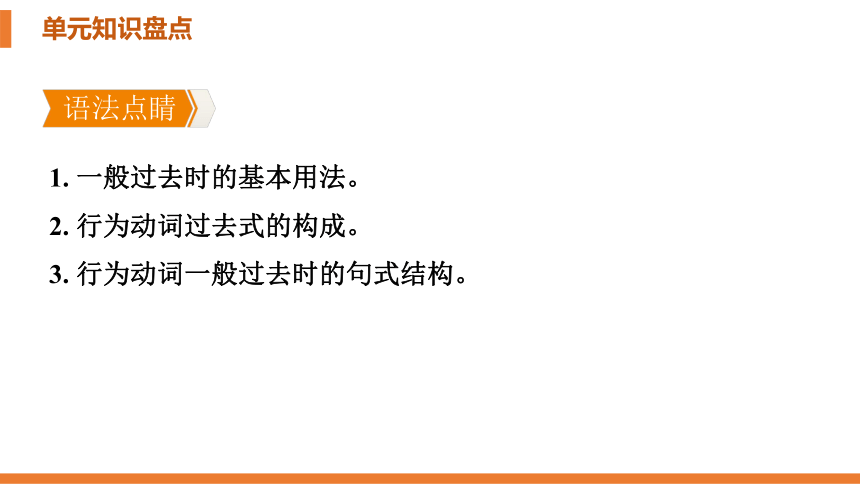
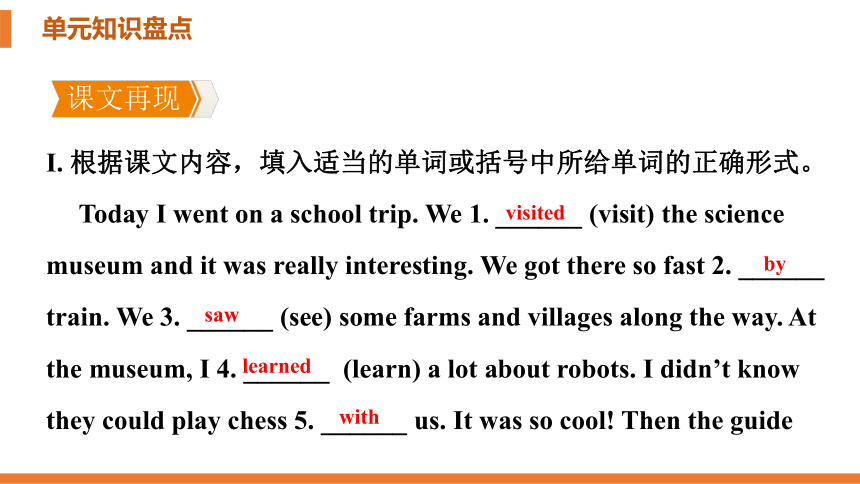
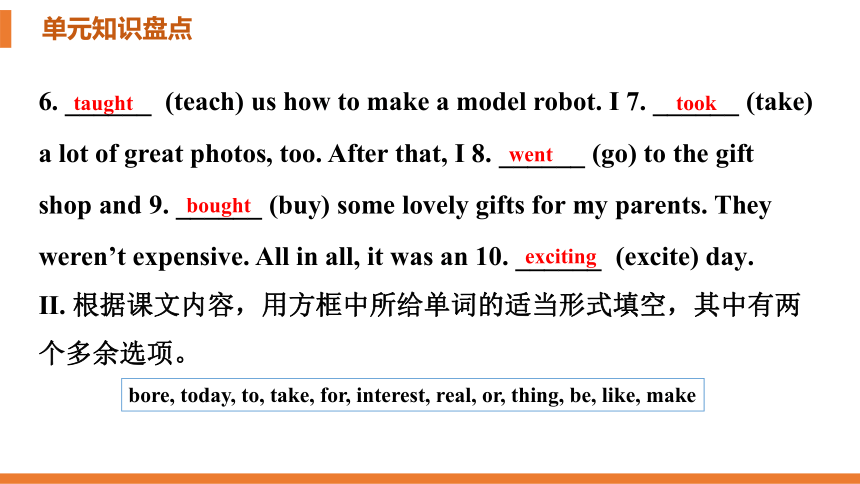
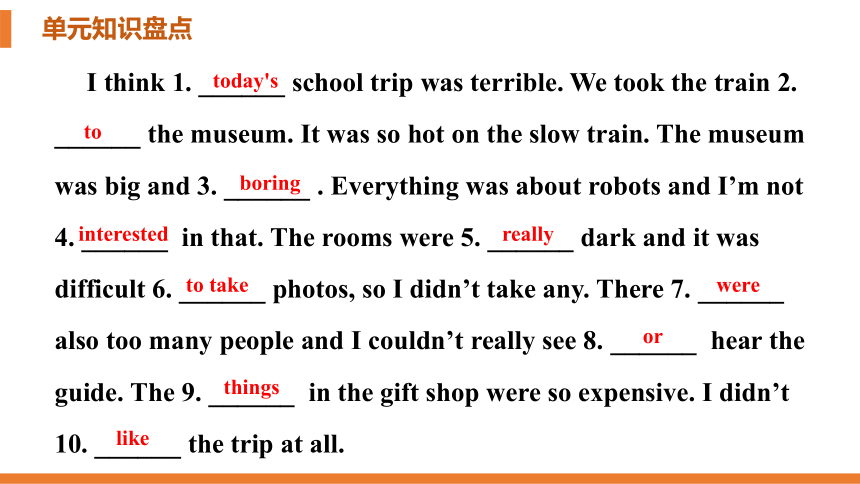
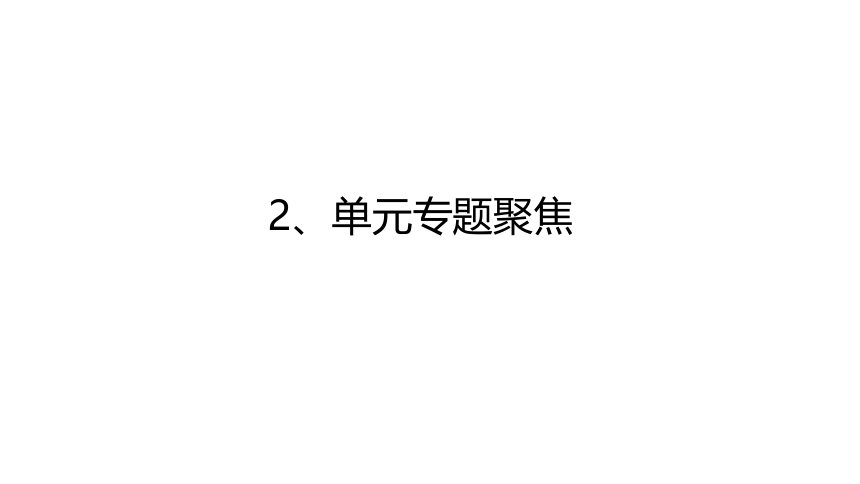
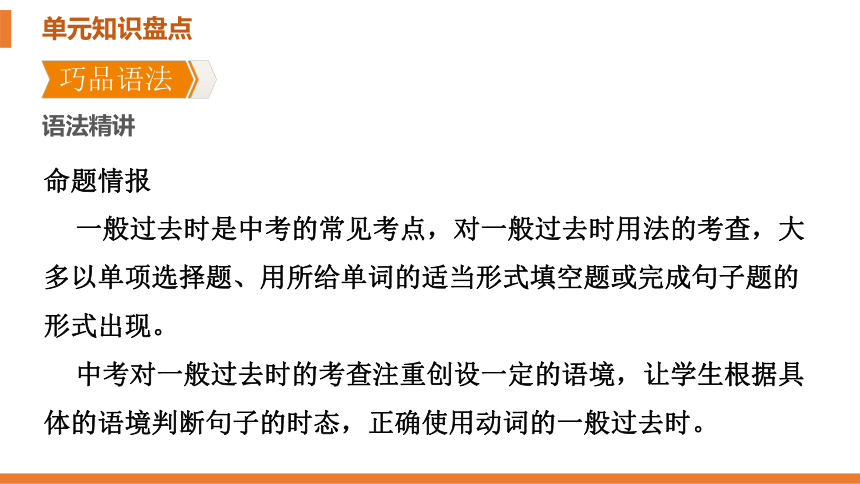
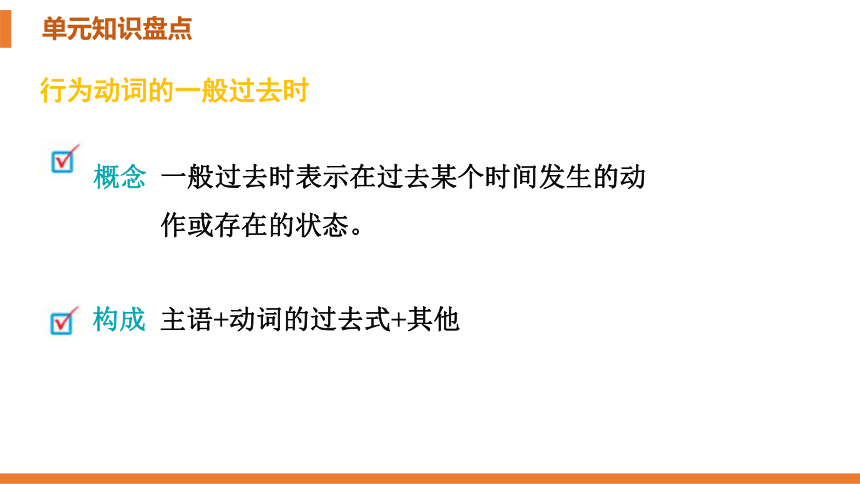
文档简介
(共49张PPT)
Unit 11 How was your school trip?
1、单元知识盘点
常用短语
1. milk a cow 给奶牛挤奶 2. ride a horse 骑马
3. feed chickens 喂鸡 4. quite a lot (of…) 许多
5. in the countryside 在乡下;在农村 6. fire station 消防站
7. go fishing 去钓鱼 8. all in all 总的说来
9. be interested in 对……感兴趣 10. not…at all 一点儿也
不……
经典句型
1. How was your trip last week
你上周的旅行怎么样?
2. I didn’t know they could play chess with us.
我(以前)不知道它们能和我们下国际象棋。
3. Then the guide taught us how to make a model robot.
然后,导游教我们如何制作机器人模型。
4. After that, I went to the gift shop and bought some lovely gifts
for my parents.
那之后,我去礼品店为我的父母买了一些可爱的礼物。
5. All in all, it was an exciting day.
总的说来,这是令人兴奋的一天。
6. There were also too many people and I couldn’t really see or
hear the guide.
(博物馆里)还有太多的人,我无法看见导游,也听不到导游说话。
7. I didn’t like the trip at all.
我一点儿也不喜欢这次旅行。
语法点睛
1. 一般过去时的基本用法。
2. 行为动词过去式的构成。
3. 行为动词一般过去时的句式结构。
课文再现
Ⅰ. 根据课文内容,填入适当的单词或括号中所给单词的正确形式。
Today I went on a school trip. We 1. ______ (visit) the science museum and it was really interesting. We got there so fast 2. ______ train. We 3. ______ (see) some farms and villages along the way. At the museum, I 4. ______ (learn) a lot about robots. I didn’t know they could play chess 5. ______ us. It was so cool! Then the guide
visited
by
saw
learned
with
taught took
went
bought
exciting
6. ______ (teach) us how to make a model robot. I 7. ______ (take) a lot of great photos, too. After that, I 8. ______ (go) to the gift shop and 9. ______ (buy) some lovely gifts for my parents. They weren’t expensive. All in all, it was an 10. ______ (excite) day.
Ⅱ. 根据课文内容,用方框中所给单词的适当形式填空,其中有两个多余选项。
bore, today, to, take, for, interest, real, or, thing, be, like, make
I think 1. ______ school trip was terrible. We took the train 2. ______ the museum. It was so hot on the slow train. The museum was big and 3. ______ . Everything was about robots and I’m not 4. ______ in that. The rooms were 5. ______ dark and it was difficult 6. ______ photos, so I didn’t take any. There 7. ______ also too many people and I couldn’t really see 8. ______ hear the guide. The 9. ______ in the gift shop were so expensive. I didn’t 10. ______ the trip at all.
today's
to
boring
interested really
to take were
or
things
like
2、单元专题聚焦
巧品语法
语法精讲
命题情报
一般过去时是中考的常见考点,对一般过去时用法的考查,大多以单项选择题、用所给单词的适当形式填空题或完成句子题的形式出现。
中考对一般过去时的考查注重创设一定的语境,让学生根据具体的语境判断句子的时态,正确使用动词的一般过去时。
行为动词的一般过去时
概念 一般过去时表示在过去某个时间发生的动
作或存在的状态。
构成 主语+动词的过去式+其他
1 一般过去时的基本用法
表示在过去某个时间发生的动作或存在的状态,常与表示过去的时间状语连用。如:
Did you go to the park on the last school trip
上次学校旅行你们去公园了吗?
2 行为动词过去式的构成
1. 规则动词过去式的构成
情况 构词方法 例词
一般情况 加-ed want→wanted
clean→cleaned
以-e结尾的词 直接加-d live→lived
like→liked
以“辅音字母+y”结尾的词 变y为i,再加-ed study→studied
carry→carried
以重读闭音节结尾且末尾只有一个辅音字母的词 先双写末尾辅音字母,再加-ed stop→stopped
plan→planned
2. 常用不规则动词的过去式
see→saw 看见 hear→heard 听见
pay→paid 支付 cost→cost 花费
spend→spent 花费 take→took 拿走
say→said 说 speak→spoke 发言;演讲
tell→told 告诉 teach→taught 教
bring→brought 带来 buy→bought 购买
sell→sold 销售;卖 go→went 去
come→came 来 think→thought 想;认为
put→put 放 set→set 设置
3 行为动词一般过去时的句式结构
We visited the museum yesterday.昨天我们参观了博物馆。
We didn’t visit the museum yesterday.昨天我们没有参观博物馆。
—Did you visit the museum yesterday 昨天你们参观博物馆了吗?
—Yes, we did.是的,我们参观了。
—No, we didn’t.不,我们没有参观。
Ⅰ. 写出下列动词的过去式
1. milk ______ 2. study ______
3. are ______ 4. go ______
5. look ______ 6. stop ______
7. say ______ 8. buy ______
9. feed ______ 10. speak ______
milked studied
考点直击
were went
looked stopped
said bought
fed spoke
Ⅱ. 用所给单词的适当形式填空
1. They ______ (take) lots of photos in the zoo yesterday.
2. She ______ (do) her homework yesterday evening.
3. I ______ (go) to a movie with my parents last night.
4. Mike made some friends and ______ (have) great fun at the party.
5. Yesterday he ______ (tell) me a piece of good news.
took
did
went
had
told
Ⅲ. 单项选择
1. —What did you do the day before yesterday
—I ______ for an English test.
A. study B. studied C. studying
2. —I called you yesterday evening, but you were not in.
—Sorry, I ______ in the shop with my mother.
A. am B. will be
C. was D. have been
B
C
3. He ______ me his name, but I can’t remember it now.
A. tells B. will tell
C. told D. is telling
4. —Don’t you see the sign “No parking!” on the right
—Sorry, I ______ . But now I know parking here is not right.
A. don’t B. didn’t
C. hadn’t D. doesn’t
C
B
5. Last summer vacation, we ______ many photos when we had
a trip to Dalian.
A. take B. takes
C. took D. will take
C
【解析】考查动词的时态。由时间状语“Last summer vacation”可知,本句为一般过去时。故选C。
6. Tom ______ the piano every day when he was in primary
school.
A. plays B. played
C. was playing D. has played
7. Oh no! I ______ my book in the lab.
A. leave B. left
C. will leave D. was leaving
B
B
8. Last week Vivian ______ a dress for her mother with her first-
month salary.
A. buy B. bought
C. will buy D. would buy
9. I still remember my happy childhood when my mother ______
me to Disneyland at weekends.
A. takes B. took
C. will take D. has taken
B
B
10. —Did Billy and Anna find a way out at last
—Yes, they ______ a plan and did it.
A. were working out B. worked out
C. are working out D. have worked out
B
Ⅳ. 句型转换
1. I did my homework yesterday. (改为否定句)
__________________________________________
2. He went to see his grandparents last Sunday. (改为一般疑问句)
__________________________________________
3. They are playing tennis on the playground now. (把now换成
yesterday改写句子)
__________________________________________
I didn't do my homework yesterday.
Did he go to see his grandparents last Sunday
They played tennis on the playground yesterday.
4. My father bought a new car last month. (改为一般疑问句,并作
肯定回答)
__________________________________________
5. The children had fun at the party. (改为否定句)
__________________________________________
—Did your father buy a new car last month
—Yes, he did.
The children didn't have fun at the party.
如何写好以“学校郊游”为话题的文章
本单元的话题是“School trips(学校郊游)”。在考试中,与之相关的常见的书面表达是“描述学校郊游的经历”,时态一般要使用一般过去时。在写此类文章时,常会用到的短语有visit the museum, go to the park/farm/countryside, take some photos等,还可以用“The school trip was great.”或“We had a great time.”等句型来总述心情或感受。现在,就让我们结合实例一起来看一下此类书面表达的写作技巧吧。
妙解写作
写 作 案 例
请你根据下面的提示内容,以“Our School Trip”为题写一篇60词左右的英语短文,描述你们去农场旅行的经历。
1. 上周六你们骑自行车去阳光农场(Sunshine Farm)旅行。
2. 上午你们体验了喂牛、挤牛奶,还摘了新鲜的(fresh)蔬菜;
下午你们在农场散步,与农场主聊天。
3. 你们玩得很开心。
素 材 积 累
词汇库
trip 旅行 visit 参观
stay 停留 meet 遇见
excellent 极好的;优秀的 luckily 幸运地
exciting 使人兴奋的;令人激动的 guide 导游;向导
visitor 参观者 yesterday 昨天
短语箱
in the countryside 在乡下;在农村
the day before yesterday 前天
go for a walk 去散步
have a good time/have fun
/enjoy oneself 玩得高兴
take photos of 拍……的照片
go camping 去野营
climb the mountain 去爬山
go to the beach 去海滩
句式链
① Our school trip was great. 我们的学校旅行非常棒。
② We had so much fun on the farm. 我们在农场玩得很开心。
③ We also took many photos of the farm. 我们还拍了许多农场的照片。
④ We went to Sunshine Park by bike. 我们骑自行车去了阳光公园。
⑤ We had an unforgettable experience. 我们拥有一次难忘的经历。
五 步 妙 解
审
体裁 记叙文 话题 学校郊游
时态 一般过去时 人称 第三人称
段落 布局 开头:总评学校郊游。 主体:详细介绍郊游活动。 结尾:说明感受和收获。 谴
(1)上个星期六我们进行了很好的学校郊游。
翻译此句:
_____________________________________________________
(2)我们也和农场主谈论农业,他告诉我们关于他的农场的事情。
①与农场主谈论农业:_________________________________
②关于他的农场的事情:_______________________________
Last Saturday we had a great school trip.
talk with the farmer about farming
something about his farm
翻译此句:
_____________________________________________________
(3)我们在农场学到了很多,玩得很高兴。
①学到很多: _________________________________
②玩得高兴: _________________________________
翻译此句:
_____________________________________________________
We also talked with the farmer about farming and he told us something about his farm.
learn a lot
have a great time
We learned a lot and had a great time on the farm.
模
开篇点题
(总评郊游)
详细描述
(郊游活动)
Last Saturday we had______________.
We ________to Sunshine Farm.
In the morning, we did something interesting.
We fed ________________.
We also went ____________________.
In the afternoon, we_____________ on the farm.
We also _________________________________
__________________ .
We ______________________________.
a great school trip
talked with the farmer about farming and he told us something about his farm
went for a walk
rode bikes
cows and milked them
to pick some fresh vegetables
简要总结
(收获、感受)
learned a lot and had a great time on the farm
Our School Trip
Last Saturday we had a great school trip. We rode bikes to Sunshine Farm. In the morning, we did something interesting. We fed cows and milked them. We also went to pick some fresh vegetables. In the afternoon, we went for a walk on the farm. We also talked with the farmer about farming and he told us something about his farm. We learned a lot and had a great time on the farm.
润
点
文章开篇先总评郊游(a great school trip),然后介绍了去目的地的方式(rode bikes),接着以时间顺序写郊游的整个过程,最后说明了收获和感受(learned a lot and had a great time)。整篇文章条理清晰。
小 试 身 手
假如今年5月1日你和父母到聊城旅游。请你根据以下表格提供的活动内容和经历写一篇70词左右的英语短文,描述一下这次难忘的经历,并谈谈你的感受。
活动 上午 1. 去东昌湖划船 2. 参观光岳楼
下午 1. 参观铁塔 2. 参观山陕会馆
特别经历 在山陕会馆遇到三个外国人,你用英语与其交谈,并告诉他们去光岳楼的路。 要求:1. 短文的开头已给出,不计入总词数。
2. 可适当发挥,以使行文连贯。
参考词汇:Guangyue Tower 光岳楼 the Iron Tower 铁塔
Shanshan Guildhall 山陕会馆
My parents and I went to Liaocheng on May 1. _______________
__________________________________________________________________________________________________________
One possible version:
My parents and I went to Liaocheng on May 1. Liaocheng is famous for its beautiful lake. In the morning we went boating on Dongchang Lake, where I had lots of fun. Then we visited Guangyue Tower. In the afternoon, we visited the Iron Tower and Shanshan Guildhall. At Shanshan Guildhall we met three foreigners. I tried to speak English with them and told them the way to Guangyue Tower. I was shy, but they were friendly to me.
I was very happy and excited that day because I could use English to help others and I really like the places of interest.
首字母提示型短文填空解题技巧
首字母提示型短文填空主要考查学生的语言综合运用能力,此类题目既能考查学生对基础知识的掌握和运用,又能考查学生对整篇文章逻辑关系的理解,还可以考查学生在情景中辨析词义的能力以及短语搭配的使用能力。此类题将短文中若干个单词抽出并留下该词的第一个字母作为提示和限制,让学生根据短文的意思,把单词拼写完整,使句子意思正确。
培优课堂
做此类试题时,应该注意以下技巧:
【典例】
Hello, everyone! I have a good friend. Her name is Amy. She cleaned her room on Saturday morning. After that, she went to a beautiful park with her parents. They 1. t______ many photos there. It was very hot, so they had icecream. On Saturday afternoon, Amy 2. v______ her grandparents with her parents. They helped her grandparents do housework. They were tired 3.
b______ happy. In the evening, they went to see an interesting
took
visited
but
movie. On Sunday morning and afternoon, Amy 4. d______ her homework. It was kind of difficult. Her mother did some shopping and cooked lunch. Her father helped her mother. They were very happy. On Sunday evening, they 5. w______ to bed early. I think she has a happy family.
did
went
【答案与解析】
1. took 由下文“many photos”可知,他们拍了很多照片。take many photos
表示“拍很多照片”,take的过去式是took。
2. visited 由下文“They helped her grandparents do housework.”可知,埃米
和父母一起看望了她的祖父母。visit表示“看望,拜访”,过去式是visited。
3. but tired与happy之间存在转折关系,使用but。
4. did 表示“做家庭作业”用do one’s homework。do的过去式是did。
5. went 句意:星期天晚上,他们早早地去睡觉。go to bed表示“去睡觉”。
go的过去式是went。
谢 谢 观 看!
Unit 11 How was your school trip?
1、单元知识盘点
常用短语
1. milk a cow 给奶牛挤奶 2. ride a horse 骑马
3. feed chickens 喂鸡 4. quite a lot (of…) 许多
5. in the countryside 在乡下;在农村 6. fire station 消防站
7. go fishing 去钓鱼 8. all in all 总的说来
9. be interested in 对……感兴趣 10. not…at all 一点儿也
不……
经典句型
1. How was your trip last week
你上周的旅行怎么样?
2. I didn’t know they could play chess with us.
我(以前)不知道它们能和我们下国际象棋。
3. Then the guide taught us how to make a model robot.
然后,导游教我们如何制作机器人模型。
4. After that, I went to the gift shop and bought some lovely gifts
for my parents.
那之后,我去礼品店为我的父母买了一些可爱的礼物。
5. All in all, it was an exciting day.
总的说来,这是令人兴奋的一天。
6. There were also too many people and I couldn’t really see or
hear the guide.
(博物馆里)还有太多的人,我无法看见导游,也听不到导游说话。
7. I didn’t like the trip at all.
我一点儿也不喜欢这次旅行。
语法点睛
1. 一般过去时的基本用法。
2. 行为动词过去式的构成。
3. 行为动词一般过去时的句式结构。
课文再现
Ⅰ. 根据课文内容,填入适当的单词或括号中所给单词的正确形式。
Today I went on a school trip. We 1. ______ (visit) the science museum and it was really interesting. We got there so fast 2. ______ train. We 3. ______ (see) some farms and villages along the way. At the museum, I 4. ______ (learn) a lot about robots. I didn’t know they could play chess 5. ______ us. It was so cool! Then the guide
visited
by
saw
learned
with
taught took
went
bought
exciting
6. ______ (teach) us how to make a model robot. I 7. ______ (take) a lot of great photos, too. After that, I 8. ______ (go) to the gift shop and 9. ______ (buy) some lovely gifts for my parents. They weren’t expensive. All in all, it was an 10. ______ (excite) day.
Ⅱ. 根据课文内容,用方框中所给单词的适当形式填空,其中有两个多余选项。
bore, today, to, take, for, interest, real, or, thing, be, like, make
I think 1. ______ school trip was terrible. We took the train 2. ______ the museum. It was so hot on the slow train. The museum was big and 3. ______ . Everything was about robots and I’m not 4. ______ in that. The rooms were 5. ______ dark and it was difficult 6. ______ photos, so I didn’t take any. There 7. ______ also too many people and I couldn’t really see 8. ______ hear the guide. The 9. ______ in the gift shop were so expensive. I didn’t 10. ______ the trip at all.
today's
to
boring
interested really
to take were
or
things
like
2、单元专题聚焦
巧品语法
语法精讲
命题情报
一般过去时是中考的常见考点,对一般过去时用法的考查,大多以单项选择题、用所给单词的适当形式填空题或完成句子题的形式出现。
中考对一般过去时的考查注重创设一定的语境,让学生根据具体的语境判断句子的时态,正确使用动词的一般过去时。
行为动词的一般过去时
概念 一般过去时表示在过去某个时间发生的动
作或存在的状态。
构成 主语+动词的过去式+其他
1 一般过去时的基本用法
表示在过去某个时间发生的动作或存在的状态,常与表示过去的时间状语连用。如:
Did you go to the park on the last school trip
上次学校旅行你们去公园了吗?
2 行为动词过去式的构成
1. 规则动词过去式的构成
情况 构词方法 例词
一般情况 加-ed want→wanted
clean→cleaned
以-e结尾的词 直接加-d live→lived
like→liked
以“辅音字母+y”结尾的词 变y为i,再加-ed study→studied
carry→carried
以重读闭音节结尾且末尾只有一个辅音字母的词 先双写末尾辅音字母,再加-ed stop→stopped
plan→planned
2. 常用不规则动词的过去式
see→saw 看见 hear→heard 听见
pay→paid 支付 cost→cost 花费
spend→spent 花费 take→took 拿走
say→said 说 speak→spoke 发言;演讲
tell→told 告诉 teach→taught 教
bring→brought 带来 buy→bought 购买
sell→sold 销售;卖 go→went 去
come→came 来 think→thought 想;认为
put→put 放 set→set 设置
3 行为动词一般过去时的句式结构
We visited the museum yesterday.昨天我们参观了博物馆。
We didn’t visit the museum yesterday.昨天我们没有参观博物馆。
—Did you visit the museum yesterday 昨天你们参观博物馆了吗?
—Yes, we did.是的,我们参观了。
—No, we didn’t.不,我们没有参观。
Ⅰ. 写出下列动词的过去式
1. milk ______ 2. study ______
3. are ______ 4. go ______
5. look ______ 6. stop ______
7. say ______ 8. buy ______
9. feed ______ 10. speak ______
milked studied
考点直击
were went
looked stopped
said bought
fed spoke
Ⅱ. 用所给单词的适当形式填空
1. They ______ (take) lots of photos in the zoo yesterday.
2. She ______ (do) her homework yesterday evening.
3. I ______ (go) to a movie with my parents last night.
4. Mike made some friends and ______ (have) great fun at the party.
5. Yesterday he ______ (tell) me a piece of good news.
took
did
went
had
told
Ⅲ. 单项选择
1. —What did you do the day before yesterday
—I ______ for an English test.
A. study B. studied C. studying
2. —I called you yesterday evening, but you were not in.
—Sorry, I ______ in the shop with my mother.
A. am B. will be
C. was D. have been
B
C
3. He ______ me his name, but I can’t remember it now.
A. tells B. will tell
C. told D. is telling
4. —Don’t you see the sign “No parking!” on the right
—Sorry, I ______ . But now I know parking here is not right.
A. don’t B. didn’t
C. hadn’t D. doesn’t
C
B
5. Last summer vacation, we ______ many photos when we had
a trip to Dalian.
A. take B. takes
C. took D. will take
C
【解析】考查动词的时态。由时间状语“Last summer vacation”可知,本句为一般过去时。故选C。
6. Tom ______ the piano every day when he was in primary
school.
A. plays B. played
C. was playing D. has played
7. Oh no! I ______ my book in the lab.
A. leave B. left
C. will leave D. was leaving
B
B
8. Last week Vivian ______ a dress for her mother with her first-
month salary.
A. buy B. bought
C. will buy D. would buy
9. I still remember my happy childhood when my mother ______
me to Disneyland at weekends.
A. takes B. took
C. will take D. has taken
B
B
10. —Did Billy and Anna find a way out at last
—Yes, they ______ a plan and did it.
A. were working out B. worked out
C. are working out D. have worked out
B
Ⅳ. 句型转换
1. I did my homework yesterday. (改为否定句)
__________________________________________
2. He went to see his grandparents last Sunday. (改为一般疑问句)
__________________________________________
3. They are playing tennis on the playground now. (把now换成
yesterday改写句子)
__________________________________________
I didn't do my homework yesterday.
Did he go to see his grandparents last Sunday
They played tennis on the playground yesterday.
4. My father bought a new car last month. (改为一般疑问句,并作
肯定回答)
__________________________________________
5. The children had fun at the party. (改为否定句)
__________________________________________
—Did your father buy a new car last month
—Yes, he did.
The children didn't have fun at the party.
如何写好以“学校郊游”为话题的文章
本单元的话题是“School trips(学校郊游)”。在考试中,与之相关的常见的书面表达是“描述学校郊游的经历”,时态一般要使用一般过去时。在写此类文章时,常会用到的短语有visit the museum, go to the park/farm/countryside, take some photos等,还可以用“The school trip was great.”或“We had a great time.”等句型来总述心情或感受。现在,就让我们结合实例一起来看一下此类书面表达的写作技巧吧。
妙解写作
写 作 案 例
请你根据下面的提示内容,以“Our School Trip”为题写一篇60词左右的英语短文,描述你们去农场旅行的经历。
1. 上周六你们骑自行车去阳光农场(Sunshine Farm)旅行。
2. 上午你们体验了喂牛、挤牛奶,还摘了新鲜的(fresh)蔬菜;
下午你们在农场散步,与农场主聊天。
3. 你们玩得很开心。
素 材 积 累
词汇库
trip 旅行 visit 参观
stay 停留 meet 遇见
excellent 极好的;优秀的 luckily 幸运地
exciting 使人兴奋的;令人激动的 guide 导游;向导
visitor 参观者 yesterday 昨天
短语箱
in the countryside 在乡下;在农村
the day before yesterday 前天
go for a walk 去散步
have a good time/have fun
/enjoy oneself 玩得高兴
take photos of 拍……的照片
go camping 去野营
climb the mountain 去爬山
go to the beach 去海滩
句式链
① Our school trip was great. 我们的学校旅行非常棒。
② We had so much fun on the farm. 我们在农场玩得很开心。
③ We also took many photos of the farm. 我们还拍了许多农场的照片。
④ We went to Sunshine Park by bike. 我们骑自行车去了阳光公园。
⑤ We had an unforgettable experience. 我们拥有一次难忘的经历。
五 步 妙 解
审
体裁 记叙文 话题 学校郊游
时态 一般过去时 人称 第三人称
段落 布局 开头:总评学校郊游。 主体:详细介绍郊游活动。 结尾:说明感受和收获。 谴
(1)上个星期六我们进行了很好的学校郊游。
翻译此句:
_____________________________________________________
(2)我们也和农场主谈论农业,他告诉我们关于他的农场的事情。
①与农场主谈论农业:_________________________________
②关于他的农场的事情:_______________________________
Last Saturday we had a great school trip.
talk with the farmer about farming
something about his farm
翻译此句:
_____________________________________________________
(3)我们在农场学到了很多,玩得很高兴。
①学到很多: _________________________________
②玩得高兴: _________________________________
翻译此句:
_____________________________________________________
We also talked with the farmer about farming and he told us something about his farm.
learn a lot
have a great time
We learned a lot and had a great time on the farm.
模
开篇点题
(总评郊游)
详细描述
(郊游活动)
Last Saturday we had______________.
We ________to Sunshine Farm.
In the morning, we did something interesting.
We fed ________________.
We also went ____________________.
In the afternoon, we_____________ on the farm.
We also _________________________________
__________________ .
We ______________________________.
a great school trip
talked with the farmer about farming and he told us something about his farm
went for a walk
rode bikes
cows and milked them
to pick some fresh vegetables
简要总结
(收获、感受)
learned a lot and had a great time on the farm
Our School Trip
Last Saturday we had a great school trip. We rode bikes to Sunshine Farm. In the morning, we did something interesting. We fed cows and milked them. We also went to pick some fresh vegetables. In the afternoon, we went for a walk on the farm. We also talked with the farmer about farming and he told us something about his farm. We learned a lot and had a great time on the farm.
润
点
文章开篇先总评郊游(a great school trip),然后介绍了去目的地的方式(rode bikes),接着以时间顺序写郊游的整个过程,最后说明了收获和感受(learned a lot and had a great time)。整篇文章条理清晰。
小 试 身 手
假如今年5月1日你和父母到聊城旅游。请你根据以下表格提供的活动内容和经历写一篇70词左右的英语短文,描述一下这次难忘的经历,并谈谈你的感受。
活动 上午 1. 去东昌湖划船 2. 参观光岳楼
下午 1. 参观铁塔 2. 参观山陕会馆
特别经历 在山陕会馆遇到三个外国人,你用英语与其交谈,并告诉他们去光岳楼的路。 要求:1. 短文的开头已给出,不计入总词数。
2. 可适当发挥,以使行文连贯。
参考词汇:Guangyue Tower 光岳楼 the Iron Tower 铁塔
Shanshan Guildhall 山陕会馆
My parents and I went to Liaocheng on May 1. _______________
__________________________________________________________________________________________________________
One possible version:
My parents and I went to Liaocheng on May 1. Liaocheng is famous for its beautiful lake. In the morning we went boating on Dongchang Lake, where I had lots of fun. Then we visited Guangyue Tower. In the afternoon, we visited the Iron Tower and Shanshan Guildhall. At Shanshan Guildhall we met three foreigners. I tried to speak English with them and told them the way to Guangyue Tower. I was shy, but they were friendly to me.
I was very happy and excited that day because I could use English to help others and I really like the places of interest.
首字母提示型短文填空解题技巧
首字母提示型短文填空主要考查学生的语言综合运用能力,此类题目既能考查学生对基础知识的掌握和运用,又能考查学生对整篇文章逻辑关系的理解,还可以考查学生在情景中辨析词义的能力以及短语搭配的使用能力。此类题将短文中若干个单词抽出并留下该词的第一个字母作为提示和限制,让学生根据短文的意思,把单词拼写完整,使句子意思正确。
培优课堂
做此类试题时,应该注意以下技巧:
【典例】
Hello, everyone! I have a good friend. Her name is Amy. She cleaned her room on Saturday morning. After that, she went to a beautiful park with her parents. They 1. t______ many photos there. It was very hot, so they had icecream. On Saturday afternoon, Amy 2. v______ her grandparents with her parents. They helped her grandparents do housework. They were tired 3.
b______ happy. In the evening, they went to see an interesting
took
visited
but
movie. On Sunday morning and afternoon, Amy 4. d______ her homework. It was kind of difficult. Her mother did some shopping and cooked lunch. Her father helped her mother. They were very happy. On Sunday evening, they 5. w______ to bed early. I think she has a happy family.
did
went
【答案与解析】
1. took 由下文“many photos”可知,他们拍了很多照片。take many photos
表示“拍很多照片”,take的过去式是took。
2. visited 由下文“They helped her grandparents do housework.”可知,埃米
和父母一起看望了她的祖父母。visit表示“看望,拜访”,过去式是visited。
3. but tired与happy之间存在转折关系,使用but。
4. did 表示“做家庭作业”用do one’s homework。do的过去式是did。
5. went 句意:星期天晚上,他们早早地去睡觉。go to bed表示“去睡觉”。
go的过去式是went。
谢 谢 观 看!
同课章节目录
- Unit 1 Can you play the guitar?
- Section A
- Section B
- Unit 2 What time do you go to school?
- Section A
- Section B
- Unit 3 How do you get to school?
- Section A
- Section B
- Unit 4 Don't eat in class.
- Section A
- Section B
- Unit 5 Why do you like pandas?
- Section A
- Section B
- Unit 6 I'm watching TV.
- Section A
- Section B
- Review of Units 1-6
- Unit 7 It's raining!
- Section A
- Section B
- Unit 8 Is there a post office near here?
- Section A
- Section B
- Unit 9 What does he look like?
- Section A
- Section B
- Unit 10 I'd like some noodles.
- Section A
- Section B
- Unit 11 How was your school trip?
- Section A
- Section B
- Unit 12 What did you do last weekend?
- Section A
- Section B
